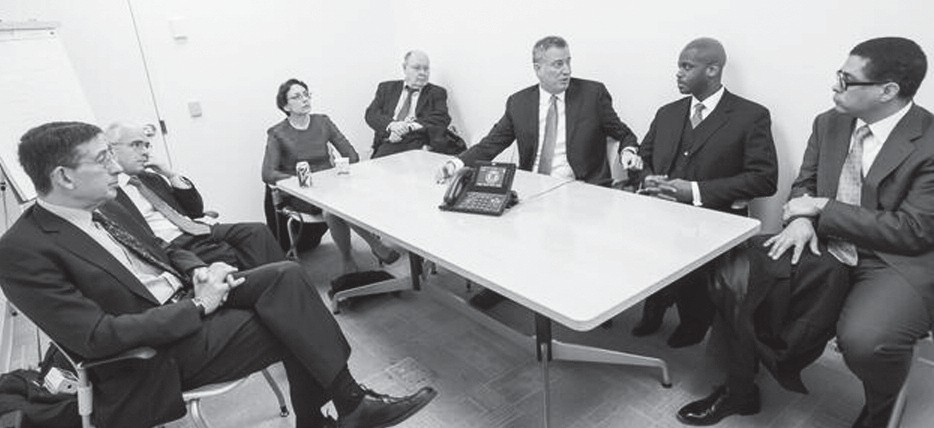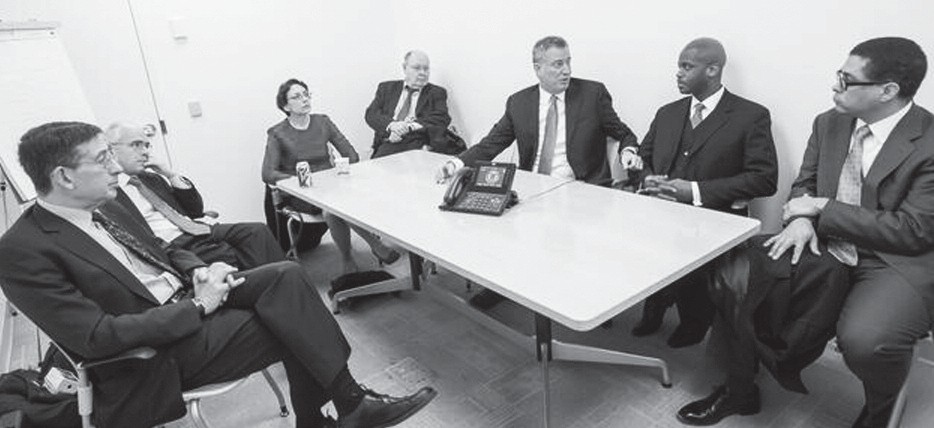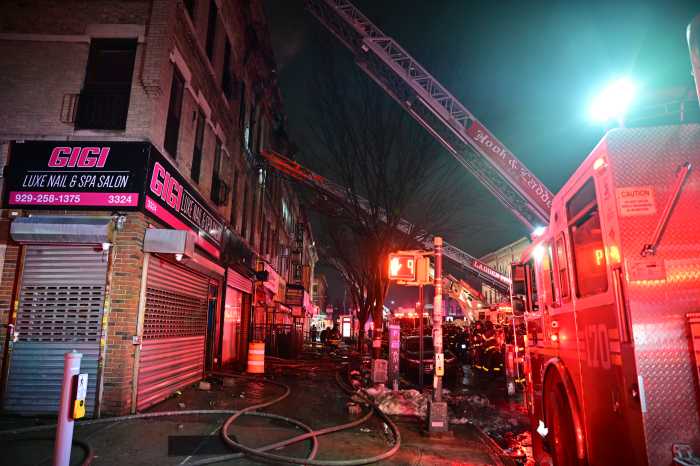Pol Talks Homelessness Causes At JPCA
The city’s homeless crisis took center stage during the Juniper Park Civic Association (JPCA) meeting last Thursday, Dec. 11, at Our Lady of Hope School in Middle Village.

JPCA President Robert Holden and fellow members welcomed Assemblyman Andrew Hevesi to speak about the escalating situation. As chairman of the Committee on Oversight, Analysis and Investigation, Hevesi had the chance to listen to homeless advocates, as well as city representatives, at a recent hearing.
“The bigger picture is that the entire state is beyond crisis,” Hevesi explained, “Two years ago, it was a crisis. Now it’s just a disaster.”
According to Hevesi, an estimated 58,000 people are homeless in New York City. Nearly 24,000 of the city’s homeless population are children, a fact that Hevesi called “terrible.” When asked about how to tackle the homeless crisis, he stated, “It’s all about prevention.”
Hevesi cited a rise in evictions and domestic violence as two main causes of homelessness. Many of the more affordable, single room occupancy dwellings created during the 1950’s have since been phased out, leaving many low income residents without shelter. The lack of affordable rentals, coupled with cost of living increases, has resulted in a rise in evictions.
“People are simply not making enough money to stay with the current housing market,” Hevesi stated. “The rents and mortgages keep going up, but people do not receive raises.”
Hevesi advocated for programs such as rental arrears and access to legal services as two possible ways in which to prevent evictions and homelessness. The rental arrears program would help residents in danger of eviction pay back rents for a limited amount of time. “It will save tax payer dollars and keep families in their homes,” Hevesi explained.
The assemblyman also spoke out in favor of legal services for tenants. According to Hevesi, about 95 percent of landlords pursuing evictions in housing court have lawyers on their side. This is in sharp contrast to the estimated 8 percent of tenants with legal representation.
“People are getting kicked out or evicted,” he added. “It’s a terrible problem and a real crisis.”
Blaming policy
When asked whether or not the city was involved in secret deals with local hotel chains to populate empty rooms with the homeless, Hevesi explained that he had similar concerns.
“I asked the city this very question at the hearing,” he stated. According to Hevesi, hotels used to house the city’s homeless are known as “cluster site shelters.”
Cluster site shelters were created under the Bloomberg administration as a way to curb rising shelter populations.
“Mayor Bloomberg was tough on the homeless, like a businessman would be,” Hevesi explained, “First, he made the shelter requirements much higher. Second, he started using our money to pay for-profit entities, like hotels, to house people.”
One of the consequences of cluster site shelters is the lack of on-site social services for homeless residents.
“These shelters are the worst policy,” Hevesi stated. “it was costing us money and we weren’t using homeless shelters the way we should, which is as a transition to get them out into a good home.”
According to Hevesi, city representatives declared under oath at the recent hearing that cluster site shelters were being phased out and called the practice “a horrible policy of the last administration.” Hevesi vowed to “keep watch” to make sure the city adheres to their word.
Immigration & wages
Another resident voiced concerns regarding the mass influx of nearly 90,000 illegal immigrant children across the country’s southern border seven months ago. When asked how many of these children were currently in city shelters, Hevesi was unsure of the exact number, but insisted that this influx was not the cause of the state’s ongoing homeless crisis.
Hevesi explained that the children who recently entered the U.S. illegally were actually fleeing violent homelands.
“These are not regular kids,” Hevesi stated. “They’re kids who are brought by their parents to flee countries where there is murder, strife, killing and civil war. I understand that many don’t want to pick up that burden, but those kids were coming here because there was a good chance that they were going to get slaughtered.”
When asked about job creation as a possible solution to the homeless crisis, Hevesi stated that he was in favor of increasing the minimum wage.
“What we have now is a whole new class of working poor,” he explained. “These are people who work full time jobs and can’t afford to pay their rent.”
While Hevesi favors a wage increase, he does not support the $15 figure many are asking for, as it may be unfair to small business owners.
“We have an income disparity problem, but you have to strike a balance,” he added.
One man’s rage
A fiery debate erupted between one resident and Hevesi while discussing the proposed Glendale homeless shelter. The resident, who wished to remain anonymous, accused Hevesi and other elected officials of helping to create the crisis.
“You’re the cause of the problem,” the man argued. “This whole homeless thing is the fault of the judges, politicians and lawyers.”
Hevesi responded with shock and dismay to these accusations: “In the past year, has there been anyone who stood up more against this shelter than I have? Any elected official or anyone in this room? The very idea that when we are in a crisis, not only as a city but as a community, that your response is to point fingers is outrageous. The only way to get through this is to problem solve together.”
The coalition speaks
Members of the Glendale Middle Village Coalition took to the stage to update residents on the ongoing lawsuit and fundraising efforts to block the proposed homeless shelter at 78- 16 Cooper Ave. on the Glendale/Middle Village border.
Coalition member and Glendale resident Dawn Scala voiced concerns over tax payer dollars being used in for-profit shelters. Scala estimates that nearly half of the cost to build and maintain Samaritan Village will go directly into property owner Michael Wilner’s pockets.
“We’re not against helping the homeless,” Scala explained, “but it needs to be done in the right way.”
Scala also advocated for greater transparency among city agencies. “One of the things that needs to be done to address the problem of getting people out of shelters is for city agencies to coordinate better,” she added.
Glendale attorney Fred Haller and GPOA President Brian Dooley echoed these concerns. Haller and Dooley reminisced about the longtime friendly competition between the two parishes’ basketball teams.
“Our Lady of Hope and Sacred Heart have always had a great rivalry and great matchups,” Dooley recalled. “But now, as communities, Middle Village and Glendale are coming together to fight this shelter.”
According to Haller, the Coalition only has one legal action in progress-the Article 78 procedure-but may begin other actions in the near future.
“Conventional means, like letter writing, have not helped,” he stated. Haller explained that the coalition’s legal team might consider pursuing “multiple legal actions” simultaneously, a prospect that could cost upwards of $100,000.
Dooley stated that the coalition has raised $71,500 as of Dec. 5, including 461 individual donations and $8,000 from October’s Yerman’s Pub fundraiser. He credited a “broad base of support in both communities” for the coalition’s success, including civic associations, chambers of commerce, residents and business owners.
Yet, despite their success, Coalition members stated that additional funds are needed to pursue future legal actions.
“There’s power in all of this,” Dooley stated, “This is our fight.”
* * *
For more information on the next Juniper Park Civic Association meeting, visit www.junipercivic.com or call 1- 718-651-5865.
































